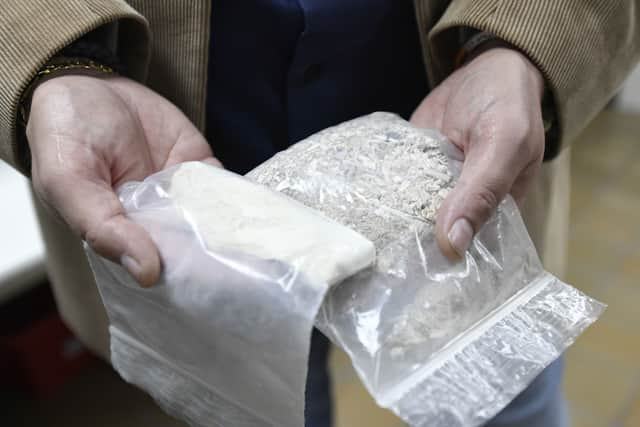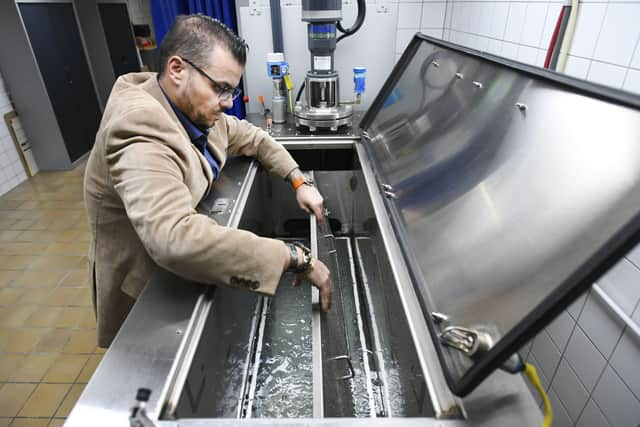Water cremation: what is resomation, meaning, potassium hydroxide water burial process explained - UK cost
and live on Freeview channel 276
Co-op Funeralcare has unveiled its latest initiative to provide an eco-friendly option for burials, departing from conventional burial and cremation methods.
As the leading funeral service provider in the UK, Co-op Funeralcare recently revealed its upcoming introduction of a sustainable practice called resomation, also referred to as water cremation or alkaline hydrolysis, set to be available later this year.
Advertisement
Hide AdAdvertisement
Hide AdThis innovative approach involves placing the deceased in a biodegradable pouch, which is then gently immersed in a container filled with pressurised water and a small quantity of potassium hydroxide. Here is everything you need to know about it.
How does it work?
The resomation method begins by placing the deceased in a biodegradable pouch, which is then immersed in a container filled with pressurised and heated water, along with a small amount of potassium hydroxide.
During the procedure, the combination of water, heat and alkaline chemicals accelerates the natural process of decomposition, and tissue and cells undergo rapid transformation, converting into a solution of micromolecules within a span of about four hours.
Following the completion of the cycle, only soft bones remain, which are subsequently dried and reduced to a powdery white substance similar to traditional cremated remains. The final product is placed in an urn and returned to the relatives of the deceased.


Advertisement
Hide AdAdvertisement
Hide AdThe practice is growing in popularity in the majority of US states, Canada and South Africa, but burials or gas cremations remain the two options for UK families. Anti apartheid campaigner Archbishop Desmond Tutu, who died in 2021, is the most high-profile figure to choose resomation for his own funeral.
Its introduction in the UK will mark the first time in more than 120 years that a new alternative to burial or cremation will be widely available for funerals since the introduction of the Cremation Act in 1902.
Why is resomation better for the environment?
Research has found that resomation is a much more sustainable alternative to conventional burial and cremation methods due to its significant lack of toxic gas emissions, air pollutants and environmentally harmful fluids.
Traditional cremation practices result in the release of carbon dioxide and potentially hazardous gases, while burials carry the risk of contaminating groundwater sources. The Co-op, which arranges more than 93,000 funerals every year, said it will be working with sustainability experts and academia to further validate existing research during its initial regional pilot.
Advertisement
Hide AdAdvertisement
Hide AdA YouGov poll commissioned by Co-op Funeralcare found that 89% of UK adults had not heard of resomation but once explained, almost a third said they would choose it for their own funeral if available.
Furthermore, nearly a fifth of adults who have arranged a funeral in the last five years said they would have considered resomation for their loved one’s funeral had it been an option at the time.


Professor Douglas Davies, an anthropologist, theologian and death rites expert at Durham University, said: “The rise in ecological and sustainability concerns over the past decade combined with a desire to be part of nature or laid to rest in a natural setting, means more people are considering the environmental impact of their body once they die.
“The reduced carbon footprint that may come with resomation compared with other forms of body disposal, means it will no doubt be of interest to many people as the practice is increasingly made available in the UK.
Is resomation lawful?
Advertisement
Hide AdAdvertisement
Hide AdThe introduction of resomation in the UK will mark the first time in more than 120 years that a new alternative to burial or cremation will be widely available for funerals since the introduction of the Cremation Act in 1902. It is understood that resomation is not illegal but will be subject to compliance with relevant health, safety and environment regulations.
Meanwhile, the Law Commission is currently reviewing existing laws to see how they can accommodate new burial methods. The Co-op has also updated the Government on its plans to make the process available in the UK, and said that questions on new burial methods were raised at the Synod of Church of England earlier this year.
How much does it cost?
The Co-op has said pilot locations for its resomation services will be announced later this year, with the intention to expand the service to all Co-op clients.
The cost of resomation can vary depending on several factors, including location, funeral service provider, and additional services chosen by the family. Since resomation is a relatively new option and its availability may be limited, the cost can vary significantly.
Advertisement
Hide AdAdvertisement
Hide AdOn average, the cost of resomation in the US is reported to range from $1,500 (£1,180).to $5,000 (£3,950) or more. However, these figures are approximate and can vary based on individual circumstances and specific choices made by the family, such as the location, funeral home and any additional services or options selected.
On its website, The Co-op says that on average in 2021, the cost of a cremation was £3,765, a figure which includes professional services, doctors fees, minister or officiants fees and the cost of the cremation. Direct cremation, with no funeral service but a simple, unattended cremation, costs £1,195 in England, Wales and Scotland.
Comment Guidelines
National World encourages reader discussion on our stories. User feedback, insights and back-and-forth exchanges add a rich layer of context to reporting. Please review our Community Guidelines before commenting.
